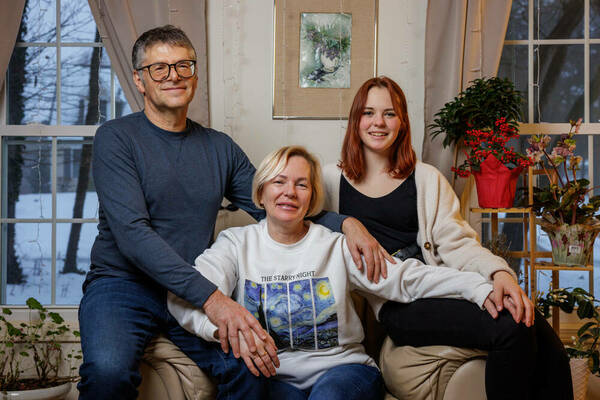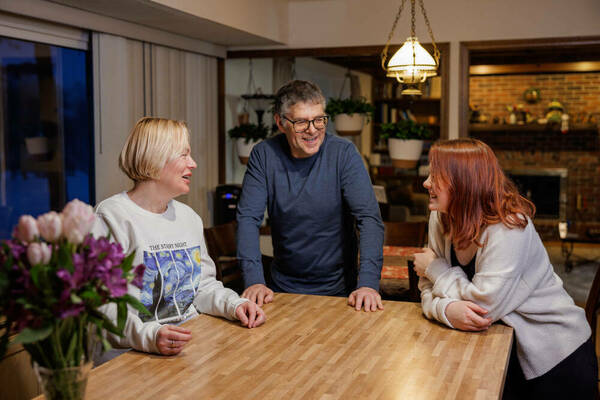
When Russia invaded Ukraine in 2022, Professor Misha Gekhtman was in Kyiv. His life changed forever for better and for worse.
Misha Gekhtman, professor of Mathematics at Notre Dame, never expected that Russia would invade Ukraine–or that fleeing for his life would also lead to falling in love, marrying, and gaining a daughter.
When he tells the story–part tragedy, part romantic comedy–Misha admits, "If I read this as a screenplay, I would laugh because it's so unbelievable." Lifetime Movie or not, it's his reality.
Born in Kyiv, Ukraine, at the height of Soviet power, his biggest dream as a kid was to travel the world. "Growing up as a Jew in Soviet Russia, I wasn't allowed to study whatever I wanted or to leave easily," Misha said. "But I was good at math, got a PhD, and it opened doors for me. Like a marble in a pinball machine, I found my way–first to the U.S. and ultimately to Notre Dame."
The 2023 winner of the College Teaching Award has been a fixture on campus for 25 years, teaching 30 different courses. He's learned to lean forward when a student raises their hand and stammers, "This might be a stupid question, but…"
"That's always when they have an idea that leads to a major development," Misha said.
But he admits that beyond his students, colleagues, and research, "What's kept me here at Notre Dame is basketball." Most days at 7 am, Misha plays Guard in a pickup league of University students and faculty, ages 19-65. Although he didn't know it then, a basketball game on February 16, 2022, would turn Misha's life upside down.
Through the league, Misha volunteered to drive a group of refugees to see the Fighting Irish Men's Basketball play at the Joyce Center. The men, who had left everything they knew behind in Afghanistan, had recently resettled in South Bend.
Misha shakes his head, recalling what happened next. "They enjoyed the chance to see this game. I never expected that one week later, I would be crossing the Ukrainian-Polish border on foot, trying to escape a war and cross a border as they had in Afghanistan." Suddenly, they had a lot in common.
War breaks out
The next morning, Misha's mother, Evgeniya, in her 80s and still living in the family apartment in Kyiv's center, called him with the sad news that his father, Isaak, was about to pass away. Rushing home on the next flight, he made it just in time to say goodbye to his dad. Jewish custom calls for those who have passed away to be laid to rest within 24 hours, and the family made arrangements for that to happen the next day.
He was jolted awake by the low, rumbling boom of an air raid. Russian forces had breached the outskirts of Kyiv in a surprise offensive. Misha's memory of that excruciating morning is a blur. Somehow, they managed to make the necessary arrangements for his late father, then hurried back to the apartment to shut off the electricity and packed a single suitcase containing his mother's entire life.
The goal was to take an evacuation train running to the West of Ukraine, get to Poland, and ultimately to Berlin, where Misha's sister, Vladislava, who was in Kyiv for the funeral, lives.
He explained, "My mom had left her home just a day after burying her husband. This was the second time she was running away from Kyiv. Eighty years earlier, when she was five years old, she was running away to Eastern Russia from Hitler's bombs."
At her age, it was difficult for Misha's mother to run and climb the many flights of stairs leading to the central train station. As they waited on the packed platform, a mother and her teenage daughter approached them. They were holding hands, and each carrying just a small backpack. "Is this where we wait for the train to Lviv?" she asked breathlessly.
Her name was Oksana Kuzemko, and she was escaping Ukraine with her teenage daughter, Viktoriia.
Oksana and Viktoriia's story
A few months before the war began, Oksana, a cosmetologist at a private clinic in Kyiv, was sitting in her psychologist's office, struggling to process grief. She was divorced and, for years, had put all her energy into raising her two daughters. Tragically, her oldest daughter had died from cancer. Now, her younger child, Viktoriia, was in her final year of high school. Trying to help Oksana continue, the psychologist said it was time to imagine a new future for herself, too.
"Describe what your ideal man would be like," the practitioner instructed.
Oksana sighed. This was such a silly exercise but she’d play along.
"His name will be Michael. He'll speak English. He will be an athlete, and he will travel all over the world," she said. Then she forgot all about it until she met Misha–the man standing before her on the train platform whose full name is Michael.
The morning of the invasion was just like any other for Oksana and Victoria. They had no idea that war was coming. When they heard the first explosions, they quickly filled two backpacks with snacks and bottled water, grabbed their identification papers, and spent the first three days sheltering in the family country house and a nearby bomb shelter. But then the bombs started falling there, too.
Reliving it, Oksana shudders. "My mom hugged me and told me that I should take Viktoriia and try to get out, but she would stay there because Ukraine is where she has spent her life." It was the last time she would get to hug her mother.
They walked miles to the train station. No schedule was posted, and knowing which track was scheduled to depart for Lviv was impossible. Viktoriia remembers, "Misha, his sister, and mom looked calm despite the chaotic environment, so we approached them to ask for directions."
Almost instantly, the Gekhtmans, Oksana, Viktoriia, and a Chinese-Canadian man nearby formed a small tribe of travelers. They intuitively knew they could trust one another and that getting to Poland in a group would be safer.
Eventually, the group shouldered their way onto a train to Vinnytsia, where they spent eight stressful hours trying to board a train that would take them further west towards the border. They were among the lucky few to make it onto a train bound for Liviv.
Oksana wedged herself onto a luggage rack precariously piled with suitcases. She and Misha passed the time by sharing their life stories with the openness of two people who thought they would never see each other again–realizing quickly that they had both experienced significant loss.
In addition to his father, Misha's wife, Marina, had passed away in 2019, leaving him alone. Their two adult sons, Ilya and Dmitri, followed in Misha's footsteps and became mathematicians too, Ilya at Israel's prestigious Technion and Dmitri in California's tech industry. Misha told Oksana all about raising the boys and the agony of losing a true love.
Finally, against all odds, after hours of talking, they made it to Lviv, where Misha gave one of their hotel rooms to Oksana and Victoria. The next day, they crossed the border to Poland on foot in the bitter winter cold, hugging at the border as friends picked Misha's family up in a car to drive to Berlin. The others were taken to a refugee shelter.
Misha says, "At first, I just wanted to help Oksana, but in retrospect, I recognize that there was an immediate spark." Months later, when Canada opened its borders to Ukrainian refugees, Misha told Oksana about it via WhatsApp. Still, it wasn't until he drove seven hours through the night to meet them at the airport in Toronto that he became aware of romantic feelings, too. But he wasn't ready to admit it out loud.
Was this destiny, he wondered.
By then, Oksana had already realized that Misha was the Michael she'd imagined with her psychologist years before. Still, she didn't want to scare him off.
One day, they were messaging one another while Misha sat in a diner in South Bend. She drew parallels to a restaurant in Kyiv they'd both known and loved.
Misha typed, "This must be destiny."
Just then, a waitress came to the table to take his order. "My name is Destiny, and I'll be your server today," she said, pointing to her nametag. Misha's jaw dropped.
Ultimately, Misha invited Oksana and Viktoriia to immigrate to the U.S. and join him in South Bend. That's when he received a straightforward text message from Oksana.
"I realize you are a nice person, but why do you insist on helping us?" it asked.
She waited with a pounding heart for six hours as Misha's three little dots flashed gray to white. What if he didn't feel the same way, she wondered.
He turns bright red when he talks about it. "I am a mathematician, and I needed to formulate the right answer," he admits. "I'm not good at talking about my feelings, but this is one problem that Oksana helped me solve."
Neither of them were looking for love. They'd each become resigned to remaining single forever. "What happened to us is pure magic," Misha admits.
Building a new life together

Six months later, Viktoriia and Oksana moved to South Bend and began their new life with Misha. Viktoriia's one requirement was that they adopt a kitten. Misha had never owned a pet and feared that the balance of his quiet life would be turned upside down–but now Mon'ka is almost always in his lap.
During Christmas break, Misha drove them South to see the ocean for the first time. In Miami, he proposed to Oksana with a ring. Then, with Viktoriia as their witness, the pair were married at City Hall in October 2023. Oksana wore a striking Ukrainian dress called a vyshyvanka for the occasion. Misha wore a matching shirt. Both were embroidered with traditional patterns meant to protect the bride and groom and bless their union.
Penn High was the fifth school that Viktoriia attended in one year. It was frustrating to repeat junior year all over again and challenging to adjust to a small Midwestern town after living in a major European capital. Eventually, she made friends and even took the initiative to land an internship at the Harper Cancer Research Institute. Viktoriia's next step is applying to college.
Misha said, "I'm always looking for ways to do something to support Ukrainians." Last year, a colleague from the Computer Science department connected Misha with the Ukrainian Catholic University in Lviv. "With a grant from Notre Dame International, I've been collaborating in creating a curriculum on the mathematics behind data science," he explained. "I'm planning to deliver a few lectures to students remotely when the class occurs."
Oksana said from their home in South Bend, "It's only been a year, but it feels like we've always been together as a family." While she attends English classes, Oksana works towards a medical assistant certification. She's grateful for the opportunities but longs for her old job at the clinic in Kyiv.
Misha admits, "A large part of my brain is always preoccupied with thinking about Ukraine. It doesn't look promising right now. Sometimes, I feel guilty that happiness like ours came from all this heartbreak."But, in a way, pushing ahead with life, with joy, is a form of resistance. Nowadays, the trio is often found at the Debartolo Performing Arts Center, dressed in blue and gold, the colors of Notre Dame and Ukraine. They clap in unison for the actors and musicians and this life they've built together as a family in South Bend.
Originally published by at international.nd.edu on February 20, 2024.